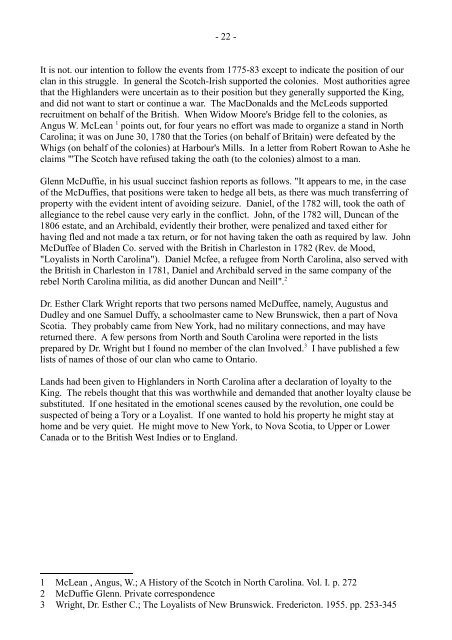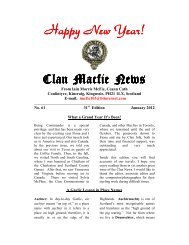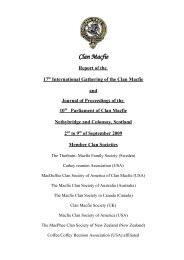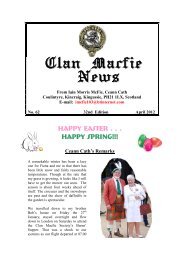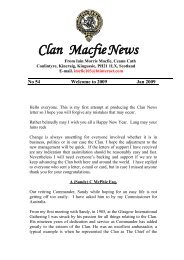Mythology, traditions and history - The Clan Macfie Society
Mythology, traditions and history - The Clan Macfie Society
Mythology, traditions and history - The Clan Macfie Society
Create successful ePaper yourself
Turn your PDF publications into a flip-book with our unique Google optimized e-Paper software.
- 22 -<br />
It is not. our intention to follow the events from 1775-83 except to indicate the position of our<br />
clan in this struggle. In general the Scotch-Irish supported the colonies. Most authorities agree<br />
that the Highl<strong>and</strong>ers were uncertain as to their position but they generally supported the King,<br />
<strong>and</strong> did not want to start or continue a war. <strong>The</strong> MacDonalds <strong>and</strong> the McLeods supported<br />
recruitment on behalf of the British. When Widow Moore's Bridge fell to the colonies, as<br />
Angus W. McLean 1 points out, for four years no effort was made to organize a st<strong>and</strong> in North<br />
Carolina; it was on June 30, 1780 that the Tories (on behalf of Britain) were defeated by the<br />
Whigs (on behalf of the colonies) at Harbour's Mills. In a letter from Robert Rowan to Ashe he<br />
claims "'<strong>The</strong> Scotch have refused taking the oath (to the colonies) almost to a man.<br />
Glenn McDuffie, in his usual succinct fashion reports as follows. "It appears to me, in the case<br />
of the McDuffies, that positions were taken to hedge all bets, as there was much transferring of<br />
property with the evident intent of avoiding seizure. Daniel, of the 1782 will, took the oath of<br />
allegiance to the rebel cause very early in the conflict. John, of the 1782 will, Duncan of the<br />
1806 estate, <strong>and</strong> an Archibald, evidently their brother, were penalized <strong>and</strong> taxed either for<br />
having fled <strong>and</strong> not made a tax return, or for not having taken the oath as required by law. John<br />
McDuffee of Bladen Co. served with the British in Charleston in 1782 (Rev. de Mood,<br />
"Loyalists in North Carolina"). Daniel Mcfee, a refugee from North Carolina, also served with<br />
the British in Charleston in 1781, Daniel <strong>and</strong> Archibald served in the same company of the<br />
rebel North Carolina militia, as did another Duncan <strong>and</strong> Neill". 2<br />
Dr. Esther Clark Wright reports that two persons named McDuffee, namely, Augustus <strong>and</strong><br />
Dudley <strong>and</strong> one Samuel Duffy, a schoolmaster came to New Brunswick, then a part of Nova<br />
Scotia. <strong>The</strong>y probably came from New York, had no military connections, <strong>and</strong> may have<br />
returned there. A few persons from North <strong>and</strong> South Carolina were reported in the lists<br />
prepared by Dr. Wright but I found no member of the clan Involved. 3 I have published a few<br />
lists of names of those of our clan who came to Ontario.<br />
L<strong>and</strong>s had been given to Highl<strong>and</strong>ers in North Carolina after a declaration of loyalty to the<br />
King. <strong>The</strong> rebels thought that this was worthwhile <strong>and</strong> dem<strong>and</strong>ed that another loyalty clause be<br />
substituted. If one hesitated in the emotional scenes caused by the revolution, one could be<br />
suspected of being a Tory or a Loyalist. If one wanted to hold his property he might stay at<br />
home <strong>and</strong> be very quiet. He might move to New York, to Nova Scotia, to Upper or Lower<br />
Canada or to the British West Indies or to Engl<strong>and</strong>.<br />
1 McLean , Angus, W.; A History of the Scotch in North Carolina. Vol. I. p. 272<br />
2 McDuffie Glenn. Private correspondence<br />
3 Wright, Dr. Esther C.; <strong>The</strong> Loyalists of New Brunswick. Fredericton. 1955. pp. 253-345


